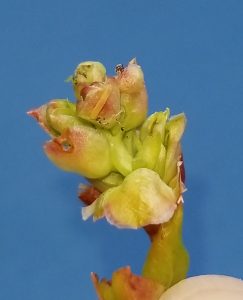Winter moth update 4/30/20
April 30, 2020
Winter moth caterpillars are growing so slowly in this cool weather! They started hatching in Kingston about March 22, 50% hatched in early April, and 90% hatched in mid-late April. Most of the caterpillars I see are still so tiny. Nearly all winter moth caterpillars are first instars – so they haven’t even molted once. This will be changing soon as warmer weather allows them to develop.
This weekend will be a good time to check apple, pear, and blueberry buds for winter moth damage and caterpillars. Using magnification, pry open fruit buds looking for caterpillars or frass (insect droppings). At URI’s orchard and blueberry patch, and at another blueberry planting in South County, RI, we have 35-50% buds with one or more winter moth caterpillars or frass. This isn’t a large population like in past years, but it’s enough to warrant spraying an insecticide. I’ve looked in a few apple and blueberry plantings in Providence and Kent County and have found very few winter moth caterpillars there. The only areas I’ve seen many winter moth caterpillars is South County. I have not looked in Massachusetts.
Next week will be a good time to spray for winter moth caterpillars in fruit plantings. Most insecticides work pretty well against these caterpillars. DiPel and other Bt insecticides are good choices since they kill only caterpillars. Bt breaks down quickly and may need to be reapplied about 5 days later. Whatever insecticide you use be sure to follow the label.
People concerned about winter moth caterpillars attacking landscape trees should scouted for winter moth caterpillars in a week or so, once caterpillars are larger and easier to find. If you have questions please email me.
The URI Plant Clinic is still open and samples can be mailed to:
URI Plant Clinic
3 East Alumni Ave.
Kingston, RI 02881
There is a $10 charge for diagnosing plant problems. Checks can be made out to URI Plant Clinic.
Stay safe,
Heather Faubert
URI Plant Clinic

 Home
Home Browse
Browse Close
Close Events
Events Maps
Maps Email
Email Brightspace
Brightspace eCampus
eCampus


